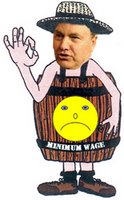Business Week: More Ammo For A Higher Minimum
New research says a ripple effect would hike the pay of a lot of family bread winners If you want to pick a fight with a free-market economist, say something nice about the minimum wage. Democrats in Congress want to raise it next year. As they gear up, economists in the opposition are arguing that it will make unskilled workers too expensive to hire. They also say it's an inefficient way to help the working poor, since a lot of the people who make the minimum wage, now $5.15 an hour, are teenagers living at home.
If you want to pick a fight with a free-market economist, say something nice about the minimum wage. Democrats in Congress want to raise it next year. As they gear up, economists in the opposition are arguing that it will make unskilled workers too expensive to hire. They also say it's an inefficient way to help the working poor, since a lot of the people who make the minimum wage, now $5.15 an hour, are teenagers living at home.
But the economics profession is far less united against the minimum wage than it was a generation ago. Since the early 1990s an influential group of economists has poked holes in the once strongly held belief that the minimum wage is a major job killer. And now there's economic research disputing the rest of the conventional wisdom. Some economists are saying that minimum-wage increases have a ripple effect, bumping up the pay of a large portion of the working poor. If they are right, that would strengthen the political appeal of a minimum wage hike by increasing the number of potential voters who are helped.
Read more!



























6 comments:
You commies,
The minimum wage is a slippery slope.
You start out upping the Min. Wage to
$6.00, then you'll want the Cadillac HealthCare. Before you know it you'll be demanding a 5 day work week.
Hey, we don't say this is good or bad. We only report what the socialist publications like Business Week print.
Cato:
Speed limit signs are a bad idea. They interfer with my ability to drive my car as fast as it will go. I don't think the Constitution says anything pro or con about a minimum wage.
The Constitution also uses the word "We" and not "Me." Call it what you will, but it's in the interest of the public's welfare to have a minimum wage. Bring some examples to the discussion that support your point of view.
Cato:
The Constitution doesn't mention that slavery is good or bad. You seem to forget that our government has a checks and balance system: legislative, judicial and executive. Obviously, the legal decision to increase the minimum wage will be voted on in the legislative branch. If the legislation gets enough votes to pass through the House and Senate, it movers to the executive branch where the President will either sign the legislation or veto it. If signed it goes into law. If vetoed, it can go back to the legislative branch where the veto could be overridden.
Once it is law, it can be challenged in the courts, i.e., the judicial branch. This would happen the constitutionality of a minimum wage comes into question. The case would work its way up through the court system to the Supreme Court. If the Supreme Court determines the minimum wage violates the Constitution then -- as determined by the current makeup of the Supreme Court -- the law would be struck down. If not, it would stand as law. Since the Constitution doesn't explicitly cover every detail that could possibly confront our nation, I believe -- and there's a couple of hundred years of US tribal knowledge to back me up on this -- the Constitution is living document that is subject to interpretation by the elected and appointed powers that be.
I think you are arguing from a laizze-faire ideological perspective that puts all its eggs in a totally free-market perspective. The checks and balances of our system of government act as a governor on our society that is not necessarily only beholding to the corporate profit interest that supports the free-market THEORY. Marxism is a theory as is democratic socialism and various others.
Personally, I don't want a totally efficient market system. I want an adult system that pays for all the costs incurred in the acquisition of capital. That includes human, environmental, material, etc., etc.
CATO:
You rant against the government interferring in the minimum wage, yet it must suit you fine that the courts can rule that workers for Mesaba cannot strike. You only complain about government interference when it favors coporate interests over those of workers.
Cato:
I believe history has shown the Constituion is used as the basis for determining whether or not laws are consitutional.
I don't recall hearing the phrase "you borke the Constitution."
Post a Comment